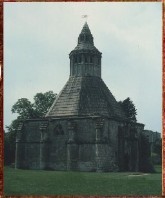|
On
Christmas day, 1376, King Edward holds a great and solemn feast, to which all
the prelates, earls, barons, and knights are invited to attend. In
theory every person who represents the king in the realm is expected,
as a show of loyalty. But as there are so many minor knights this is not
practical, and for lesser provincials one attendance during a lifetime is
considered sufficient, but anyone of distinction or within a day's journey
of Westminster is expected to attend this annual event, and absence
would be noted and studied, probably with disfavor.
|

|
After
a religious service in the abbey, the king leads his guests in a procession
to the great hall of Westminster (left). There he sits on a
throne at the high table, raised so that he can see all his guests.
Richard, his grandson by Prince Edward, is raised up and carried before
the king, who invests him, in the presence of the lords just mentioned,
with the succession to the throne, to hold it after his death, and the
king seats Richard beside him. The amount of food is lavish and the
feasting goes on for hours. King Edward requires an oath from all
prelates, barons, knights, officers of the cities, towns, ports, and
frontier posts of England that they will recognize Richard as their king.
[Froissart's Chronicles and Lady of the Sun, F. George Kay].
|
|
Yule
was sometimes a fifteen day vacation for peasants, and on various Glastonbury
manors this included a special feast at the manor house. Tenants cut
and carried logs for the Yule fire, and each brought a faggot of brushwood
as well as his own trencher, a mug, and a napkin of some kind if he would
eat off a cloth. The feast included plenty of bread and broth and
ale, with two kinds of meat. Games were played and carols
sung. [Life on the English Manor, H. S. Bennett].

|
|